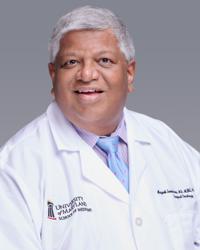Colon Cancer

UM Capital Region Health patients have the comfort of knowing their care is in the good hands of an experienced, highly skilled team of colon cancer specialists that includes gastroenterologists, oncologists, and surgeons.
The UM Capital Region Health cancer care team includes providers with expertise in colon cancer treatment at all stages of the disease.
Through proven testing and treatment methods, we provide personalized care patients need for the best possible outcomes.
Also called colorectal cancer or rectal cancer, colon cancer develops in the tissues of the colon or rectum. It can cause symptoms such as:
- A change in bowel habits (e.g., diarrhea, constipation or feeling that your bowel does not empty all the way) lasting more than a few days
- Blood in your stool (bowel movement)
- Abdominal pain, aches or cramps that don’t go away
- Unexplained weight loss
It is important to tell your doctor right away about these or other symptoms that concern you.
Colon cancer might not cause any symptoms, at least not right away. It could be that your symptoms are being caused by another health condition altogether. If, after their own examinations, your doctor suspects colon cancer, they will refer you to the UM Capital Region Health cancer care team for further workup and consultation.
Our Colon Cancer Team
Our team of colon cancer experts — including surgeons, medical oncologists and radiation oncologists — are well-versed in modern approaches to treatment of this disease. They will walk you through your options as well as connect you with support services and guide your follow-up care.
Colon Cancer Diagnosis
We use several advanced screening tests to detect colon cancer, including:
- Colonoscopy - a thin, flexible, lighted tube is used to check for cancer inside the colon and rectum
- Biopsy - removal of a sample of tissue for testing
- Blood tests
- Stool tests -checking for blood in the stool and genetic changes that may be a sign of colon cancer
We will discuss with you the pros and cons of each appropriate test as well as how often you should be tested.
Once colon cancer is diagnosed, we may need to do more testing to find out what stage the cancer is in, which factors into your treatment plan.
Colon Cancer Treatment
UM Capital Region Health’s colon cancer specialists consider a number of factors when determining which treatment options are right for you, including:
- The type, stage and location of the cancer
- Your overall health
- Your preferences
Surgery to remove the cancer is the most common form of treatment for all stages of colon cancer. Other possible treatments include:
- Chemotherapy - use of drugs to stop the growth of cancer cells and relieve colon cancer symptoms
- Radiation therapy - use of high-energy radiation to kill cancer cells or keep them from growing
- Targeted therapy - use of drugs or other substances to identify and attack specific cancer cells
- Cryosurgery, or cryotherapy - process in which abnormal tissue is frozen and destroyed
Contact Us
To learn more about the colon cancer services available at our location, schedule an appointment or make a referral, call us at 240-677-8300.

